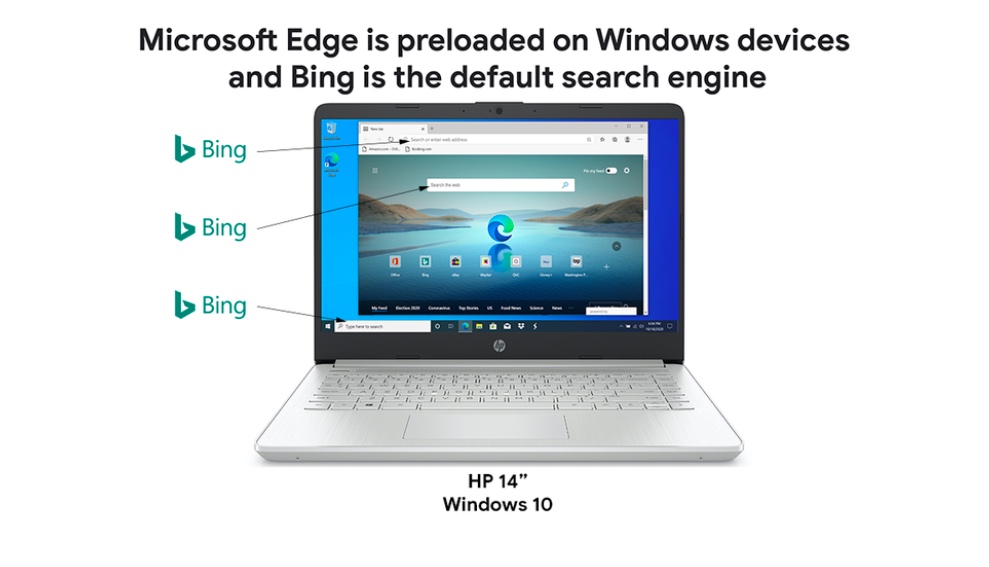Google has responded to the antitrust lawsuit filed against it by the US Department of Justice. In a blog post, the company called the lawsuit “deeply flawed” and said it would do nothing to help consumers.
The DOJ called Google a “Monopoly Gatekeeper” in its antitrust lawsuit against the Mountain View tech giant. The case even says that Google, a “scrappy startup” that became the “darling of silicon valley,” is “long gone.”
“The Department’s Dubious Complaint” Is How Google Sees It
In its blog post, Google made several clarifications as to how it pays for increased visibility of its services and how it helps maintain lower phone prices.
The company says “the Department’s complaint relies on dubious antitrust arguments” to criticize its efforts to make Google Search easily available to people.
The response published by the company is filled with demonstrations of how you’re free to choose any default search engine. It showed GIFs and images proving how you can change services “faster than you can walk to another aisle in the grocery store.”
iOS, Windows, Android, And Google Search

In a rather elaborate statement, Google mentioned that Apple chooses Google as the default search engine because it’s “the best.” It also pointed out that Yahoo and Microsoft Bing pay Apple to get featured in the Safari web browser.
Coming to desktops, Google rightly says that most desktops come preloaded with Microsoft Edge with Bing as the default search engine. Addressing Android, the company says its promotional agreements with carriers allow it to distribute Android for free, which reduces the phone’s cost.
Google: Leave It To The People
It’s the ultimate point that Google is trying to make in its favor. It says that the lawsuit thinks Americans aren’t sophisticated enough to change their default service providers. It says that over 204 billion apps were downloaded in 2019, most of which were not preloaded on the phone. For instance, Spotify, Instagram, Snapchat, and Amazon are some of the apps that don’t come pre-installed.
Google says that people aren’t just looking for information on Google search. They’re using dedicated search services provided in the apps. So if I want to buy something, I’m more likely to search for it on Amazon and not Google, which isn’t entirely true.
What Google Won’t Say
When Google says that the antitrust lawsuit is baseless and dubious, let’s take it with a pinch of salt. Android is open source, sure, just the bare Android, not the services. Literally no manufacturers would take up Android without Google Mobile Services (GMS), which includes the Play Store too.
So if someone somewhere decides to use bare “free” Android, minus the GMS, they’ll have to replace all of Google’s apps with their own. One such example is that of the Fire Phone from Amazon. The company based it on bare Android and even with its vast resources, Amazon tanked the Fire Phone because it’s near-impossible to replicate the vast app gallery of the Google Play Store.
Let’s talk about the lawsuit now. With Google on the radar, it is one of the biggest antitrust lawsuits in American history, and the outcome is likely to have a global impact. However, if I have to search the web for something, I’m more likely to go with Google than with Bing or Yahoo search.
The reason is simple. Quality. The quality of search results you can get from Google is just exceptional when compared to its competitors. This exceptional service, too, is the result of the monopoly Google has had on the online search market. It refined itself because of its vast user base.
If the lawsuit goes south for Google, we won’t just get rid of a monopoly, but also a search engine which is providing relatively good service. On the other hand, if allowed to proceed the way it has operated so far, Google is likely to kill the available options, which is not acceptable either.
Another possibility here is a change of attitude from Google, similar to what we saw after Microsoft’s antitrust trial. For the uninitiated, Microsoft faced a trial for maintaining a monopoly in the PC market by bundling its own services with Windows software. After the trial, Microsoft was much more lenient towards other OEMs using Windows to distribute their software.
Maybe, just maybe, we’ll get to see a similar outcome at the end of this case. We may see Google becoming more lenient towards the other developers using the Play Store to distribute their products. Maybe like Europe, we’ll also get to choose the default search engines when we boot our Android phones for the first time.
The post Google: DOJ’s Antitrust Case Is “Deeply Flawed” With “Dubious Arguments” appeared first on Fossbytes.
from Fossbytes https://ift.tt/3jj0lKE
via IFTTT



0 comments:
Post a Comment